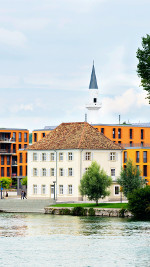Objectives and Profile

Objectives
Creating Free Scopes for Research
A central purpose of the Institute was to allow its fellows – scholars from both Konstanz and other universities in Germany and throughout the world – to pursue research free of teaching and administrative duties. Such a research framework has become increasingly attractive as a result of higher numbers of students in many universities and time-consuming administrative and evaluative responsibilities.
Since October 2007, both well-established and younger scholars were invited to the Institute to either significantly advance their work or bring it to the stage where it can be published. One in two IAS fellowships was reserved for junior faculty members.
In the case that fellows had been granted a leave by their university, the Institute took on the costs of their replacement, as a rule on the level of a German W2 salary.
Fostering International Exchange
In line with the role of the Institute for Advanced Study as a center for international scholarly contact, renowned researchers met with those at an earlier phase of their careers in both the Bischofsvilla and the Seeburg. A special quality of the Institute was the informal and intensive exchange between senior fellows and those at earlier points in their careers. Likewise, external fellows had close working relations with scholars at Constance.
Profile
Over the past years the size of the Institute for Advanced Study Konstanz – 20 to 25 fellows annually – has proven optimal: large enough for lively intellectual exchange, yet flexible thanks to clearly defined organizational structures. Annual invitations for research on particular core themes (for example, “culturalization” and “non-knowledge”) were meant to further promote interdisciplinary exchange between fellows.
The program and activities of the Institute for Advanced Study Konstanz were closely tied to the University of Konstanz and its research and teaching. This not only encouraged productive dialogue on both sides, but served to better integrate the Institute’s guests into the scholarly life at Konstanz. The Institute likewise encouraged its internal and external fellows to form and intensify contacts with interested students working on both a master’s and doctoral level.
In Konstanz fellows enjoyed an attractive academic and research location: in 2012 the university once again received a “seal of excellence” in the framework of the German Federal “Excellence Initiative.” The “Cultural Foundations of Social Integration” Center of Excellence, itself first honored in 2006 in that initiative’s framework, was highly positively evaluated in 2012 and extended for a seven-year period. With two striking locations, the Institute for Advanced Study was a major focal point of the Center’s activities.